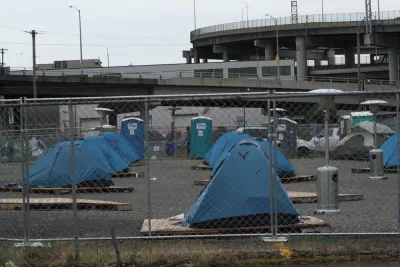Advocates point to a bevy of successes in slowing the spread of the virus, but authorities struggle with cost burden.

When COVID-19 swept across the United States last spring, it prompted a bevy of emergency public health responses, including the leasing of hotel and motel rooms to safely house vulnerable homeless people. Though far from perfect, the projects got thousands of people into non-congregate shelter and helped prevent further COVID outbreaks. As the pandemic drags on, state and city officials are looking to expand or revive those leasing efforts, or outright buy hotels as a permanent housing solution. What is driving the expansion, and why do some communities still avoid the hotel housing model?
Hotel rooms had been used to house people on the verge of homelessness for years before COVID-19, but the risk posed by the pandemic spurred local governments to lease these rooms at a larger scale. In some cases, local governments that once housed a few hundred people now house thousands, and they’re doing it with greater urgency than ever before.
Advocates of expanding the use of hotel rooms for this purpose point to the struggles facing the hospitality industry. Occupancy is down as both leisure and business travel have collapsed while large gatherings go virtual and people forgo unnecessary trips. A Jan. 21 report by the American Hotel & Lodging Association (AHLA) indicates that business is not expected to return to pre-COVID-19 levels for at least three years, and that half of all hotel rooms in the U.S. will remain empty until then.
The hotel housing programs may continue to expand due to a promise of more federal reimbursement. In the past year, many programs, such as ones in California and Vermont, were aided or enabled by a FEMA policy that reimbursed 75 percent of the leasing costs. On Jan. 21, the new Biden administration ordered FEMA to reimburse local governments at 100 percent of the cost through Sept. 30.
That decision is a game changer, says ...
FULL STORY: As the Pandemic Continues, Officials Look to Long-Term Housing Options with Hotels

Planetizen Federal Action Tracker
A weekly monitor of how Trump’s orders and actions are impacting planners and planning in America.

San Francisco's School District Spent $105M To Build Affordable Housing for Teachers — And That's Just the Beginning
SFUSD joins a growing list of school districts using their land holdings to address housing affordability challenges faced by their own employees.

The Tiny, Adorable $7,000 Car Turning Japan Onto EVs
The single seat Mibot charges from a regular plug as quickly as an iPad, and is about half the price of an average EV.

As Trump Phases Out FEMA, Is It Time to Flee the Floodplains?
With less federal funding available for disaster relief efforts, the need to relocate at-risk communities is more urgent than ever.

With Protected Lanes, 460% More People Commute by Bike
For those needing more ammo, more data proving what we already knew is here.

In More Metros Than You’d Think, Suburbs are Now More Expensive Than the City
If you're moving to the burbs to save on square footage, data shows you should think again.
Urban Design for Planners 1: Software Tools
This six-course series explores essential urban design concepts using open source software and equips planners with the tools they need to participate fully in the urban design process.
Planning for Universal Design
Learn the tools for implementing Universal Design in planning regulations.
Smith Gee Studio
City of Charlotte
City of Camden Redevelopment Agency
City of Astoria
Transportation Research & Education Center (TREC) at Portland State University
US High Speed Rail Association
City of Camden Redevelopment Agency
Municipality of Princeton (NJ)





























